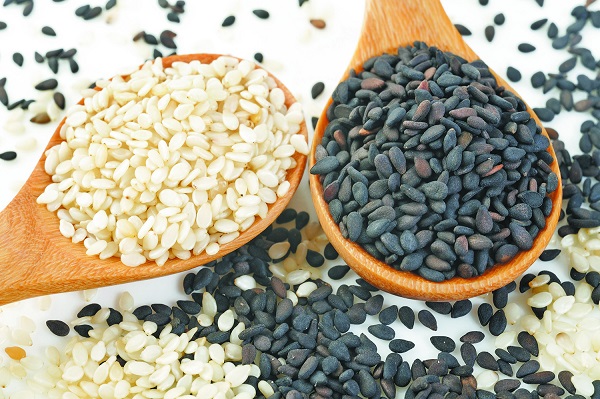
As the world reels from the socio-economic impacts of the novel Coronavirus Disease 2019 (COVID-19), many world governments are looking for ways to cushion the negative effects of the pandemic on their economies.
Just like the other countries, the Nigerian government is looking to diversify into other areas with the capacity to contribute to the nation’s gross domestic product (GDP) and complement what the country gets from exporting her crude oil.
One of the sectors with such strong potentials is agriculture. Stakeholders in the sector believe that farmers’ access to good, virile seeds at the right time will go a long way in boosting agricultural output in the country.
Speaking to Science Nigeria, the president of the National Sesame Seed Association of Nigeria, Sherrif Balogun, identified sesame seeds as one of many with great potentials to turn the tide of economic recovery for the nation.
Sesame (Sesamum indicum L.) is a diploid 2n = 26 plant belonging to the family of pedaliaceae. Sesame is widely adopted as an early crop because it can grow under hot and dry conditions.
He said the market drivers of sesame include the rising number of patients with high cholesterol and blood pressure who are adding the seeds to their diets. Coupled with this, the increasing number of diabetic patients is anticipated to boost the growth of the sesame seeds market in the forecasted period.
“Sesame is cultivated for its seeds which are very nutritious and confer numerous health benefits. The functional ingredients in sesame protect against hypertension, hypercholesterolemia, cancers and for managing atherosclerosis, diabetes mellitus, obesity, chronic renal failure, rheumatoid arthritis, Alzheimer’s disease as well as dermatological diseases,” he said.
According to him, amidst the coronavirus pandemic, people have been including nutritional food in their daily life. Even though the pandemic has disrupted the supply and chain, the rapid growth in digitization has increased the sales of sesame seeds across the globe. In addition, he opined that the growing adoption of sesame seeds in personal care products such as skin cleansers and hair products is expected to boost the growth of the market.
Sherrif explained that there are two types of sesame seeds produced in Nigeria – the white/raw food-grade used in baking which contains 98 to per cent white grade seeds and the brown/mixed type primarily used for oil production.
“Currently, there are 26 sesame-growing states in Nigeria – Adamawa, Bauchi, Benue, Borno, Gombe, Jigawa, Kaduna, Kano, Katsina, Kebbi, Kogi, Nasarawa, Niger, Plateau, Sokoto, Taraba, Yobe and Abuja. Jigawa has the highest area of production and total production in the country followed by Benue State,” he said.
He believes that Nigeria can produce up to 1.5 million tonnes [of sesame] per annum. He pointed out the major challenge is the lack of capacity to extract the oil industrially, as most sesame farmers are only able to harvest, thresh, clean, and put in bags for sale.
“Production statistics show that 60 to 70 per cent of the sesame seed produced in the country is exported abroad. As a result, industrial processing and utilization of sesame have not been fully developed in Nigeria. However, the product is locally processed and utilized in various forms in the states where the crop is cultivated. Principal among the products are kantun ridi and kunun ridi. At the local level, the oil is extracted from the seed and the cake is made into kulikuli which, together with the leaves, are used to prepare local soup known as miyan taushe. Experts believe that for Nigeria to maximize her potential, she has to increase production, set up de-hauling plants for value-addition and set up a sesame oil-processing plant,” he added.

Speaking exclusively to Science Nigeria, the director-general of the Raw Materials Research and Development Council (RMRDC), Prof. Hussaini Ibrahim, said the council has carried out numerous intervention programmes and formed strategic alliances to boost the sesame sub-sector.
“The RMRDC has taken giant strides in promoting sesame seed production and processing in Nigeria. In its efforts to promote increased sesame seed production, the council in collaboration with National Cereal Research Institute (NCRI), Badeggi, Niger State, boosted the production of sesame through the provision of improved sesame variety (2 tonnes of kenana 4 from Sudan) to Sasakawa Global 2000 and sesame seed associations of Nasarawa, Niger, Kaduna, Kebbi and Jigawa states.
“Sesame seed production was also promoted in Abaji Area Council of FCT with the distribution of 2.5 tonnes of improved sesame variety. Likewise, RMRDC organized and hosted a stakeholders’ meeting on Sesame at Lafia, Nasarawa State to sensitize farmers on global best practices in sesame production and investors on economic and industrial potentials of sesame. To promote value addition to sesame seed, the council has established a sesame processing plant at the Technology Incubation Centre, Agege, Lagos for oil and cake production. Establishment of the plant catalysed the establishment of other sesame seeds’ processing plants across the country.,” he said.
The RMRDC boss added that in 2019, the bakery and confectionery products segment contributed a significant market share which is expected to grow at a healthy rate during the forecast period. The increasing adoption of sesame seeds in the bakery and snacks is driving the growth of the market. Moreover, the rising inclination towards healthier products is boosting the market growth. The cosmetics segment is expected to grow at a robust rate owing to the growing demand for organic/natural cosmetics across the globe.
“Also, to improve sesame seed quality, reduce processing time and increase output, local utilisation and export, the council deployed multi-grains thresher and winnowing machines to Nagari Ridi Cooperative Society, Dakin Gari, Kebbi State. The thresher has the capacity of threshing 1.5 tonnes of grains (sesame, sorghum, millet, maize, groundnut, beans) per hour while the winnowing machine can process 500 kg of grains per hour. This effort has catalysed investments in sesame processing in Kebbi State with production rising to about 2000 tonnes per annum.
“The RMRDC, in partnership with the Dantata Group of Companies is establishing a sesame seed processing factory at Abaji Area Council, FCT. The processing factory would comprise 1 tonne/hour sesame seed dehulling plant, 8,000 tonnes/annum multi- purpose grains cleaning machine, 4.5 tonnes/hour mini-sesame seed oil extracting machine and 100 tonnes/day sesame seed oil refinery. In line with the project agreement, RMRDC has met its obligations, if not for some challenges beyond its control. Danata Group of Companies would also have fulfilled its responsibility of providing the infrastructure and installing all the equipment for the process plant. RMRDC has continued with its programme of boosting improved sesame seed production,” he maintained.
Ibrahim noted that the RMRDC has also established a model plant designed to serve as a demonstration centre to encourage investors to utilize proven indigenous processing technologies and academic research on raw materials development and utilization in Nigeria.
“The RMRDC has also installed an edible oil extraction plant with many nozzle sizes at the centre todetermine the oil yield and quality of some of Nigeria oilseeds. As a result of its various nozzle sizes, the expellers are capable of processing a variety of seeds and nuts of various sizes. They have been used to expel sesame oil. Without a doubt Nigeria will soon develop requisite capacities for sesame seed development locally. Given its multiple uses in several industrial sectors and its foreign exchange generation capability, RMRDC is set to collaborate with willing investors to use sesame seed development as a yardstick to foster post-COVID-19 era industrial development agenda in Nigeria,” he added.


